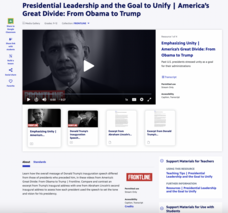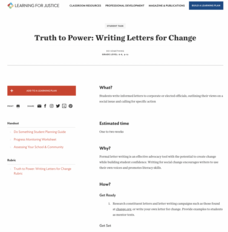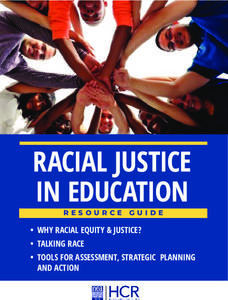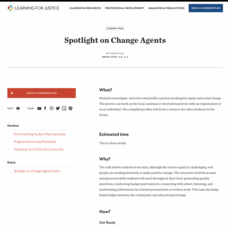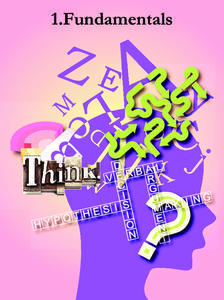Crabtree Publishing
Why Does Media Literacy Matter?
Criticism of news and entertainment journalism is at an all-time high. Help 21st-century learners develop the media literacy skills they need to become critical consumers with a three-lesson guide the looks at persuasive techniques used...
PBS
Presidential Leadership and the Goal to Unify | America’s Great Divide: From Obama to Trump
Traditionally, a United States President's Inaugural Address establishes the tone and vision for his presidency. It has stressed the goal to unify the country and bring the political parties together after what are often divisive...
Teaching Tolerance
Parallels Between Mass Incarceration and Jim Crow
Is history repeating itself? A riveting lesson examines the parallels between mass incarceration in the U.S. and the Jim Crow Laws of the past. Academics review Jim Crow Laws and compare them to mass incarcerations of African Americans....
Teaching Tolerance
Understanding the Prison Label
Break the chain. An engaging lesson examines why it is so hard to break free of the prison system in the US. Academics participate in a reader's theater, read primary sources, and discuss their thoughts. The lesson explains the hardships...
Teaching Tolerance
Introducing 'The New Jim Crow'
When Jim Crow Laws ended, the intent behind them did not. Academics read "The New Jim Crow Laws" and an interview from the author to understand how racism has not ended, but rather changed over time. The lesson explains how prejudices in...
Teaching Tolerance
Talking About Race and Racism
Set the stage for discussion in a thought-provoking instructional activity on racism. An informative resource prepares scholars to discuss the history of race and racism with a quiz, vocabulary, and guidelines. Academics discuss topics...
Teaching Tolerance
Civic Engagement and Communication as Digital Community Members
Don't feed the Internet trolls! Using a thought-provoking resource, pupils brainstorm a whole-class list of the possible kinds of bias young people may experience online. Next, in small groups, scholars create posters illustrating how to...
iCivics
Students Power Elections
A Students Power Elections resource guide provides would-be voters with the guidance they need to become voters. Included in the packet is information about voter registration and voting, how to research candidates and ballot measures,...
Encyclopedia Britannica
Presidential Electability
There are specific constitutional requirements that candidates must meet to become president of the United States. In addition, there are societal opinions that affect a candidate's electability. Class members examine historical...
Teaching Tolerance
Tweeting for Change
Do some good with social media. Secondary scholars participate in a live Twitter chat focusing on social justice issues. The thought-provoking activity allows academics to set up a live chat, create responses, and express their personal...
Teaching Tolerance
Truth to Power: Writing Letters for Change
Can letter writing really create social change? Pupils create and mail formal letters addressing a specific organization to promote social change they wish to see. Class members reflect on the process and responses they received in small...
Teaching Tolerance
Puppet Show
It's a play, it's a story, it's a puppet show! A lively resource provides academics with a creative outlet to express their views on diversity and social justice. Scholars are responsible for writing, creating, and performing a puppet...
Teaching Tolerance
Poetry and Storytelling Café
Academics take turns as actors in an engaging poetry cafe. Elementary learners work in small groups to create original poems or stories addressing community issues and read their work in front of a live audience. Scholars also reflect...
National Education Association
Racial Justice in Education Resource Guide
Strive for racial justice within your classroom community with help from an 80-page resource guide. Five modules move scholars through thoughtful, and reflective grand conversations to making a plan, then taking action. Learners write...
Facing History and Ourselves
Standing Up to Hatred on Cable Street
The final lessons in this section of the Standing Up for Democracy unit ask class members to consider ways they can help create a "more humane, fair, and compassionate environment" in their communities. For context, learners study how...
Facing History and Ourselves
Defining Our Obligations to Others
Introduce young learners to the concept of a Universe of Obligation, a term coined by sociologist Helen Fein, with a lesson that asks learners to consider the extent to which they feel a responsibility for others. Class members read and...
Facing History and Ourselves
Blending In and Standing Out
An excerpt from Sarfraz Manzoor's memoir about how his experiences as a Pakistani growing up in England shaped the way he though about his identify provides a stimulus for a discussion of how experiences can shape our concept of identity...
Teaching Tolerance
Why Do We (Still) Celebrate Columbus Day?
What are we really celebrating on Columbus Day? The resource explores the narrative behind Columbus Day and ways for people to change the perception. Scholars also review vocabulary terms associated with the topic and how attitudes have...
Teaching Tolerance
Spotlight on Change Agents
A thought-provoking resource guides learners as they interview agents of social change and share their findings. Scholars select an individual, create questions, conduct the interview, and create a profile of the person they selected....
Teaching Tolerance
Picture Books
Aspiring artists and budding writers combine their skills in an interactive lesson. Young scholars become authors when they create their own picture books focused on social justice. The resource guides learners through the writing and...
Education Bureau of Hong Kong
Decision-Making
Designed to be included in the fourth lesson in the "Learning and Teaching of Critical Thinking Skills" series, this presentation models for viewers how to use the Decision Making worksheet to weight factors.
Education Bureau of Hong Kong
Mental Models
Critical to responsible decision making is becoming aware pre-conceived notions and biases that influence our perceptions. A colorful slide presentations asks viewers to consider these mental models that factor into their assumptions and...
Education Bureau of Hong Kong
Fundamentals
"Fundamentals," the first lesson in a series of eight, introduces the basic concepts and strategies covered in a series of resources designed to teach high schoolers critical thinking skills. The worksheets and activities in this first...
Education Bureau of Hong Kong
Mental Models
Behaviors are often based on assumptions. That's the big idea in the third lesson of a series of critical think resources. Through a series of worksheets, learners examine the conscious and heretofore unconscious assumptions that...



